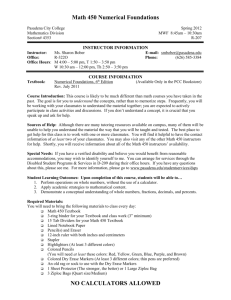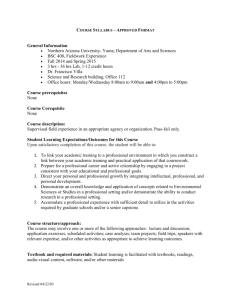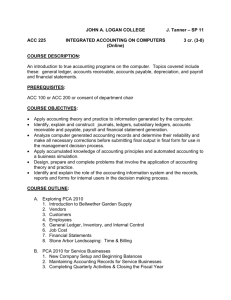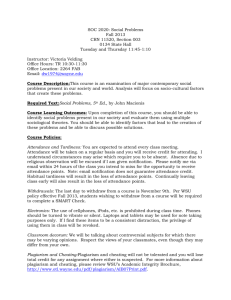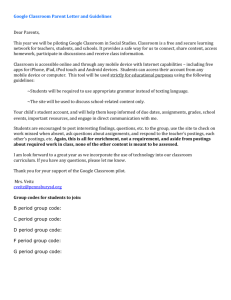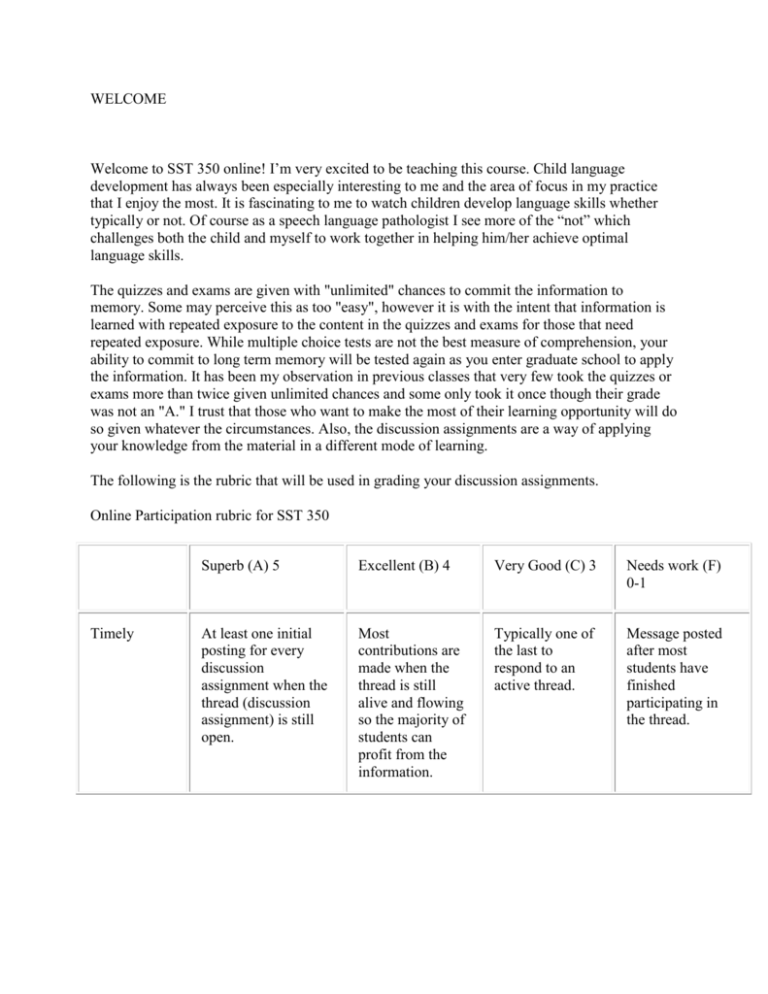
WELCOME
Welcome to SST 350 online! I’m very excited to be teaching this course. Child language
development has always been especially interesting to me and the area of focus in my practice
that I enjoy the most. It is fascinating to me to watch children develop language skills whether
typically or not. Of course as a speech language pathologist I see more of the “not” which
challenges both the child and myself to work together in helping him/her achieve optimal
language skills.
The quizzes and exams are given with "unlimited" chances to commit the information to
memory. Some may perceive this as too "easy", however it is with the intent that information is
learned with repeated exposure to the content in the quizzes and exams for those that need
repeated exposure. While multiple choice tests are not the best measure of comprehension, your
ability to commit to long term memory will be tested again as you enter graduate school to apply
the information. It has been my observation in previous classes that very few took the quizzes or
exams more than twice given unlimited chances and some only took it once though their grade
was not an "A." I trust that those who want to make the most of their learning opportunity will do
so given whatever the circumstances. Also, the discussion assignments are a way of applying
your knowledge from the material in a different mode of learning.
The following is the rubric that will be used in grading your discussion assignments.
Online Participation rubric for SST 350
Timely
Superb (A) 5
Excellent (B) 4
Very Good (C) 3
Needs work (F)
0-1
At least one initial
posting for every
discussion
assignment when the
thread (discussion
assignment) is still
open.
Most
contributions are
made when the
thread is still
alive and flowing
so the majority of
students can
profit from the
information.
Typically one of
the last to
respond to an
active thread.
Message posted
after most
students have
finished
participating in
the thread.
Collaborative
and
significant
Student positively
responds to 2
separate responses of
others with pertinent
and original insights.
There is no attempt
to dominate
conversation.
Multiple postings on
same topic contribute
to the flow of
conversation.
Responds to the
work of others.
Comments are
usually
informative
and/or original.
Multiple postings
that contribute to
the flow of
conversation.
Student seems
unaware or
uninterested in
responding to
others without
being prompted.
May dominate
conversation or
denigrate others’
point of view.
Only one posting
per assignment.
Student offers
inadequate
responses to the
comments of
others; short or
without new
ideas. Postings do
not advance the
substance of the
conversation. One
or fewer postings
per assignment.
Scholarly
Postings include
analysis or synthesis
of course materials,
own experience,
and/or colleagues
postings. Posting
includes citations to
external materials of
high academic
quality (e.g., peerreviewed). Postings
are thoughtful,
academic and
stimulating. Postings
are pertinent to the
assigned topic and
are also brief.
Postings usually
include analysis
or synthesis of
course materials,
own experience
and/or colleagues
postings. Postings
are pertinent to
the assigned topic
and represent
original thoughts.
Postings contain
material copied
from course
materials or
outside sources
without
condensing
through analysis
or synthesis.
Long and/or offtopic.
No evidence of
cognitive
processing of
course material or
analyzing own
experience
through the lens
of course
materials. Posting
isn’t directly
relevant to
assignment.
SYLLABUS
College of Health Professions
Health Sciences
Speech Science & Language Technology
SST 350: Communication Development in Children
3 credit hours
Fall 2010
Instructor: William R. Culbertson, Ph.D.
Online Office Hours: Tuesday, 6:00-8:00 p.m. In addition to office hours I check my Vista mail
regularly.
Use your Vista mail account, NOT your NAU email account, to contact me.
Phone contact: You may contact me by phone at (928) 523-7440 during work hours.
Students are able to obtain help with Vista or computer operations at the Academic Computing
Help Desk by calling (928) 523-9294 or 1-888-520-7215. Online help is available at
http://www4.nau.edu/achd
Students MUST check to see if their browser works with Vista. To check this you can do it in
Vista itself or before logging into Vista. https://vista.nau.edu/webct/entryPageIns.dowebct (it's
right below the login link).
Course Description: Normal Development of speech and language, including the relationship of
perceptual, cognitive, social-emotional, motor, and communicative factors; emphasis on
language and articulatory systems as well as articulation and language acquisition.
Required Textbook: Pence, K. & Justice, L. (2008). Language Development from Theory to
Practice. Upper Saddle River,New Jersey & Columbus, Ohio: Pearson Prentice Hall.
This textbook is available at the NAU bookstore and is also available as an e-text for $43.44
(price subject to change). The ISBN # is 0135011469 at http://www.coursesmart.com/students
The e-text is yours to keep for life (as long as you don't encounter computer difficulties, such as
it crashing, etc.).
Learner Objectives: The student will:
Describe prominent theories of language acquisition.
Describe varieties of learning and interaction styles across individuals, age groups and cultures.
Interpret normal development of motor, cognitive, social-emotional, and communicative
development from birth through adolescence.
Identify the major components of language.
Perform basic morphological and syntactic analysis.
Course Structure/Approach:
The course will cover the following components of language/communication development : 1)
Identify the major components of language and communication; 2) Learn about normal
development as it pertains to language/communication from birth through adolescence in the
following areas: motor, cognitive, social-emotional, and communication 3) Explore prominent
theories of language acquisition; 4) Discover varieties of learning and interaction styles across
individuals, age groups and cultures; 5) Perform basic morphological and syntactic analysis.
NOTE: If this approach sounds a lot like that of Ms. Kristan Culbertson, M.S., that is intended.
We are both teaching SST 350 this term, and have coordinated our efforts so as not to confuse
students. In case you are curious as to why we have the same last name, it is because we are
married!
Discussion Groups:
We will engage in a-synchronized discussions for modules 1,5,7,8 using a rubric outlining
expectations and points available. Refer to the "Welcome" page in the "Getting Started" folder to
access the rubric and point system. Further instructions will be found in "Discussions" on your
course tools. I feel confident that each of you brings unique and interesting insight and
experience with communication in some form or another. This aspect of the class will allow you
to expand on this as well as integrate new information.
My hope for you is that you will find this course intellectually aerobic as well as having some
fun with online learning. You might consider asking yourself this important question as you
spend long hours preparing in this course, “If I had a stroke and needed an SLP, would I want me
for a therapist?”
Grades:
The points possible for this class are as follows:
Discussions (4): 5 points each
Module quizzes:
Module 1: 50 points
Module 2: 25 points
Module 3: No quiz
Module 4: 25 points
Module 5: 20 points
Module 6: 20 points
Module 7: 20 points
Module 8: 20 points
Morphological and syntactical analysis assignment (MLU assignment) : 1 assignment worth 100
points (75 for morpheme analysis and 25 for DSS). Please consider that this is 1/4 of your grade
so even if you get 100% on all quizzes and exams, you will still receive a "C" for the course.
Midterm exam will cover modules 1,2, & 4: 50 points
Final exam will cover modules 5,6,7,8: 50 points
GRADE POINT SCALE: The grade point scale is based on 395 possible points. Assignment
of letter grades is based upon the percentage of the total points a student earns, as follows:
A = 90% to 100%
C = 70% to 79%
B = 80% to 89%
D = 60% to 69%
F = <60%
Possible reasons for obtaining an incomplete or failing grade:
Didn’t have time to do the reading.
Didn’t have time to do any of the discussions.
My dog died.
Just not that interested in language/communication development.
I understand “life happens.” I’ve been there too. I thought I would add this so each of you knows
that I totally support you in what ever decisions you make in earning ( I don’t “give” grades)
your grade for this class.
Quizzes/Exams/Assignments
Quizzes and exams are open book, multiple choice. You may take each module quiz and the
midterm and final exams unlimited times with the highest score counting toward your grade.
You will refer to the vista calendar to access discussion due dates, MLU project due dates, quiz
due dates, and exam due dates. I recommend that you take the syllabus quiz as soon as possible
to understand the expectations of the class.
If you wait till the last minute to complete the quizzes and exams, plan for computer difficulties.
If you have an "unstable" computer, make other arrangements (library, Kinko's etc) for taking
your quiz/exam.
Statement on Plagiarism and Cheating
Plagiarism is representing someone else's ideas as your own and not giving the author or authors
due credit. Cheating is copying all or part of someone else's assignment or test, and representing
the work as your own. Students who plagiarize or cheat will receive an F in the course. Review
NAU's Policy on Academic Dishonesty in the Student Handbook.
Plagiarism: It is understood that in developing any required class projects, that the student cites
each reference source and gives the proper credit for an idea, quotation or finding. Failure to cite
the source of referenced material is unprofessional and violates the code of conduct for
undergraduates. Please read the Academic Dishonesty Policy. The NAU Cline Library also has
this information available for you http://library.nau.edu/information/guides/plagiarism.html
Cheating: Cheating is intentionally using or attempting to use unauthorized materials,
information or study aids in any academic exercise. Cheating on any exam will result in an "F"
or "0" points awarded for that exam. You will be expected to do your own work. Any suspicion
of the contrary will be fully investigated and possibly result in consequences appropriate for
academic dishonesty. In this class, all cases of academic dishonesty will be processed at the
maximum penalty level of NAU's policy (see above). Examples of academic dishonesty include
but are not limited to: intentional plagiarism (claiming the work of others are your own),
unintentional plagiarism (not accurately acknowledging the work of others), using any amount of
purchased or borrowed material from services that provide research papers or term papers,
submitting the work of a group as that of an individual, using text found on the internet without
appropriate citation (very common and very illegal), and others.
University Policies
Policies on Safe Working and Learning Environment, Students with Disabilities, Institutional
Review Board, and Academic Integrity Policies are available in the student handbook and on the
NAU Website.
Students must read the student handbook involving academic policies and procedures.
http://www4.nau.edu/stulife/handbookcode.htm
ASHA Standard III
Learner
Outcomes
Describe
prominent
theories of
language
acquisition.
Describe
varieties of
learning and
interaction
styles across
individuals, age
groups and
cultures.
Interpret
normal
development of
motor,
cognitive,
socialemotional, and
communicative
development
from birth
through
adolescence.
Identify the
major
components of
language.
Perform basic
morphological
and syntactic
analysis.
A
B
C
D
E
F
G
H
Principles
Knowledge
Knowledge
Prevention
Ethical
Research
Professional
Professional
Assessment
of
of basic
of Nature and
Conduct Principles Issues
Credentials
Method
Sciences human
of speech, assessment
processes language, and
hearing
intervention
and comm.
disorders
Quiz, Test
X
Discussion
groups, Quiz,
Test
X
Discussion
groups, Quiz,
Test
X
Discussion
groups, Quiz,
Test
X
Quiz, Test,
Project
X

